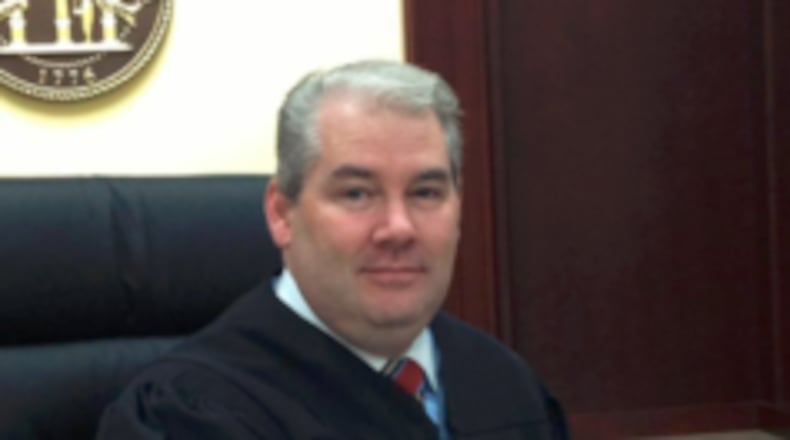A Cherokee County judge has been charged with ethics violations for his social media posts after authorities arrested the man accused of killing eight people at three metro Atlanta spas.
Superior Court Judge David Cannon’s posts on Facebook defending a Cherokee County Sheriff’s Office spokesman amount to “willful misconduct in office” or “conduct prejudicial to the administration of justice which brings the judicial office into disrepute,” said the complaint, filed last week before the Georgia Supreme Court.
Lester Tate, an attorney representing Cannon, said Georgia has no prohibition against judges posting comments on social media. He also said the charges brought by the state judicial watchdog agency appear to infringe upon the judge’s free speech rights.
During a March 17 press conference, Capt. Jay Baker said that Robert Aaron Long, the man accused in the spa shootings, was “pretty much fed up and kind of at the end of his rope. Yesterday was a really bad day for him and this is what he did.” The comments were criticized by many as being insensitive.
Credit: Alyssa Pointer / Alyssa.Pointer@ajc.com
Credit: Alyssa Pointer / Alyssa.Pointer@ajc.com
The next day, Cannon, a judge since 2013, defended Baker on Facebook and posted a transcript of the press conference.
“I believe he was summarizing what he was told by the investigators that interviewed the accused from the accused perspective,” Cannon wrote. “And Jay was not saying from Jay’s perspective that the accused had a bad day. Feel free to disagree, but read the transcript first!”
When someone commented on Cannon’s post, saying he thought Baker should not have said what he said, the judge did not disagree.
“As a judge I don’t like them tainting the jury pool about a confession that may or may not be admissible depending on the circumstances,” he wrote. “So I’d rather them just say ‘we caught him.’”
Cannon appeared before the investigative panel of the Judicial Qualifications Commission three days later to explain his social media posts.
Cannon said that when he made the posts, he knew the case had been assigned to another judge, the complaint said. But he acknowledged that in the future it was possible that law enforcement could ask him to sign warrants in the case.
Cannon said he felt the need to respond because he was so upset the Sheriff’s Office was being perceived as “a joke,” the complaint said. He also admitted that he knew he was “pushing the rule,” the complaint said.
The JQC filing said Cannon committed six violations of the code of judicial conduct. Among them: he failed to act in a manner that promoted public confidence in the independence, integrity and impartiality of the judiciary; he lent the prestige of his office to advance the private interests of others; and he commented on a pending case in a court on which he serves.
Chuck Boring, the JQC’s director, declined to comment.
Tate, who once headed the judicial watchdog agency, said he hopes to work out a satisfactory resolution.
But Tate also noted that the U.S. Supreme Court in 2002 struck down a rule in Minnesota that barred judicial candidates from commenting on disputed legal or political issues.
“Judge Cannon did not surrender his First Amendment rights when he became a judge,” Tate said. “What they’re trying to do here is stitch together other provisions from the code of judicial conduct to infringe upon a judge’s free speech rights. I don’t think they can do that.”
Long, who is also charged with murder in Fulton County, is expected to resolve the murder charges against him in Cherokee during an arraignment hearing set for Tuesday.
Credit: TNS
Credit: TNS
About the Author
Keep Reading
The Latest
Featured




